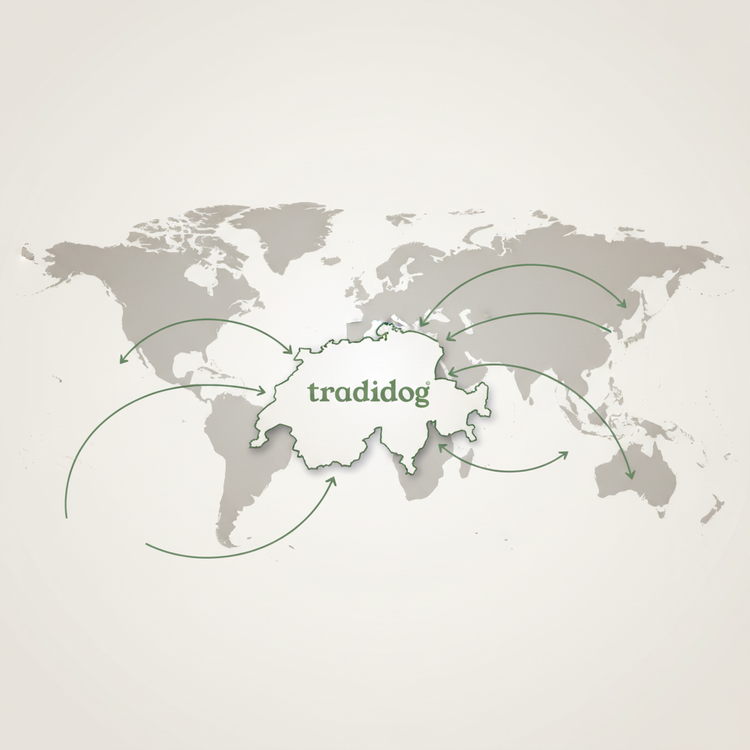
Leash requirement for dogs in Switzerland
Get ready for a somewhat heavy-duty, but nonetheless very important blog post. The next few sections will be all about the leash law. We'll explain when you have to put your dog on a leash and when you don't. We'll also cover some of the cantonal regulations. So sit back and read carefully. This way, you can avoid an unnecessary fine and instead invest the money in animal-friendly products from our online shop .
Advantages and disadvantages of a leash requirement:
The leash requirement for dogs, which exists in some places in Switzerland, has both advantages and disadvantages that affect both you as a dog owner and society. Here's an overview:
Advantages of the leash requirement
- Wildlife protection : Especially during the breeding season, the leash requirement protects wild animals and their young from potential disturbance and attacks by unleashed dogs. This helps maintain ecological balance and protect wildlife in their natural environment.
- Safety for people and dogs : Requiring dogs to be kept on a leash in busy areas such as city parks, pedestrian zones, or playgrounds contributes to the safety of pedestrians, cyclists, and children. Leashes also help control unexpected encounters between dogs, preventing potential conflicts or injuries.
- Promote responsible dog behavior : Leash laws encourage dog owners to better control their dogs and teach them obedience. This contributes to a positive perception of dogs in society and demonstrates that the needs of others are respected.
- Avoiding conflicts : Leash laws reduce potential conflicts between dog owners and other people who may be afraid of dogs or bothered by dogs running loose.
Disadvantages of the leash requirement
- Restricted movement for dogs : Dogs need space to exercise sufficiently and to be able to pursue their natural instincts to run and play. A leash requirement restricts their freedom of movement and can be stressful, especially for active and large dogs.
- Limited socialization : For dogs to socialize, it's important that they can interact freely with other dogs. Leash requirements can make these interactions difficult or restrictive, which can impair the dog's social development.
- Psychological stress for dogs : Dogs who are constantly kept on a leash can become stressed or frustrated, especially if they can't exercise. This can lead to behavioral problems because the dog can't release its energy.
- Challenges for dog owners : Leash laws require constant attention and patience from dog owners, especially in areas where regulations vary. This can make walking less relaxing and create additional challenges if the dog pulls strongly or is poorly behaved on a leash.

Legal regulations on leash requirements
So let's get to the legal part of this blog post. Don't worry, this isn't going to be a university lecture on the topic of leash laws. Nevertheless, here are a few important points:
There is no uniform, nationwide leash requirement for dogs in Switzerland; regulations vary by canton and municipality. Most cantons have specific regulations, which often vary seasonally or regionally.
Examples of cantonal regulations:
- Canton of Bern : There is no general leash requirement. However, dogs must be kept on a leash in certain places, such as school grounds, playgrounds and sports fields, public transportation, train stations, bus stops, pastures with livestock, and in nature reserves where appropriate signage is posted.
- Canton of Zurich : From April 1 to July 31, dogs must be kept on a leash in forests and at their edges to protect wild animals during the breeding and nesting season. The edge of the forest is defined as an area within 50 meters of the forest.
- Canton of Lucerne : During the main breeding season from April 1 to July 31, dogs must be kept on a leash in forests and on forest edges. In nature reserves and parks, dogs must be kept on a leash year-round.
- Canton Glarus : Dogs must be kept on a leash year-round in forests and on their edges. Working dogs are exempt from this rule.
It's important to note that municipal regulations may apply in addition to cantonal regulations. Therefore, you should always check the specific regulations in your region and pay attention to local signage.
Regardless of the leash requirement, as a dog owner you are obligated to keep your dog on a leash in a manner that does not endanger or bother either people or animals. Violations of the leash requirement may be punishable by fines, depending on the canton.
Seasonal and regional differences
In Switzerland, leash regulations vary considerably by canton and municipality. Here are some examples of regional differences:
- Forest and forest edge rules: In many cantons, such as Zurich and Lucerne, dogs must be kept on a leash in forests and on forest edges during the breeding and nesting season (usually from April 1 to July 31) to protect wildlife. In Glarus, however, dogs must be kept on a leash year-round in forests and forest edges, while in other cantons, such as Bern, this restriction only applies in specially designated areas.
- Nature reserves and parks : Some cantons, such as Lucerne and Zurich, have special regulations for nature reserves and parks, where dogs are often required to be kept on a leash year-round. In urban areas such as Zurich or Geneva, stricter rules often apply to accommodate higher population density and increased pressure on public green spaces.
- Special locations and municipal rules : In more urban areas, there are often additional regulations for places like school grounds, playgrounds, and busy pedestrian zones. For example, the canton of Bern has a leash requirement in such specific locations, while more rural cantons have fewer restrictions.
- Municipal regulations : In addition to cantonal regulations, many municipalities have their own regulations. These may relate to specific local conditions, such as popular tourist destinations, animal pastures, or heavily frequented hiking trails. Sometimes there are even seasonal off-leash areas for dogs in municipal parks where dogs are not required to be on a leash.
- Exceptions for working dogs : In some cantons, such as Glarus, exceptions apply to working dogs (e.g. hunting dogs, guide dogs), which are exempt from the leash requirement while they are working.

Penalties and fines for violations
In Switzerland, penalties and fines for violations of the leash law vary depending on the canton and the severity of the offense. Generally, the following consequences can occur:
- Fines : Failure to comply with the leash requirement will usually result in a fine. The amount may vary depending on the canton and the situation. For example, in the canton of Zurich, the fine for walking a dog without a leash in the forest during the breeding and nesting season is 60 francs.
- Criminal consequences : If a dog is found off-leash and endangers or injures people or animals, criminal prosecution may be initiated. This can result in heavy fines or, in serious cases, further legal consequences.
- Liability for damages : If a dog causes damage without a leash, the owner is liable for the resulting costs. This includes medical treatment for injured persons or animals, as well as property damage.
- Imposition of measures : In cases of repeated violations or serious incidents, authorities may take measures such as requiring the dog to be kept on a leash or muzzled. In extreme cases, they may even restrict or prohibit the dog's ownership.
It's important to note that the exact penalties and measures vary depending on cantonal legislation. As a dog owner, you should familiarize yourself with the specific regulations in your canton to avoid violations or potential fines.
Conclusion
Leash law in Switzerland is a topic shaped by cantonal and municipal regulations and strongly depends on regional conditions. It primarily serves to protect people, wildlife, and other dogs, but it presents a challenge for you as a dog owner and your four-legged friends. The advantages of leash law lie in increased safety and respectful interaction, while the disadvantages primarily lie in the restricted freedom of movement and social interaction of dogs. Violations of the leash law can result in fines and other consequences, with penalties varying by canton.
Overall, the leash requirement is a compromise that aims to balance the interests of dog owners, animals, and society. It is therefore important that you, as a dog owner, inform yourself about regional regulations and lead your dogs responsibly. Flexible regulations in many cantons make it possible to meet dogs' needs while respecting the rules.
Tradidog motto: If you keep your dog on a leash when in doubt, the problems will solve themselves.
Here you can also find some of the regulations of the respective cantons:
Share

